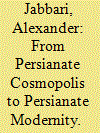| Srl | Item |
| 1 |
ID:
092948


|
|
|
|
|
| Publication |
2009.
|
| Summary/Abstract |
The patronage system at the Mughal court drew many Safavid poets and men of learning to India who interacted with Indians at various levels. In an unusual case, the young Iranian poet 'Urf?'s attachment to his patron, Prince Sal?m (later Emperor Jah ng?r), was interpreted by some as more than merely professional and the poet's death at a young age gave rise to speculations of intrigue. Mughal princesses were also actively involved in the literary scene of the time. In another instance, the association of Princess Z?bunnisa, daughter of the Emperor Awrangz?b, with Persian poets was sometimes personal, leading to gossip and scandal about her. It turns out that in both cases stories about the sexual aspects of the relationships between Mughal patrons and Iranian poets arose in the eighteenth century and are more reflective of the concerns of the literary culture of that period. This paper explores the power and gender dynamics of these poet-patron relationships in the context of the general Iranian-Indian tension at the Mughal court and a highly developed and creative tradition of crafting biographical accounts.
|
|
|
|
|
|
|
|
|
|
|
|
|
|
|
|
| 2 |
ID:
185874


|
|
|
|
|
| Summary/Abstract |
This article examines twentieth-century Persian translations of Urdu-language works about Persian literature, focusing on two different Persian translations of an influential Urdu-language work on Persian literary history, Shiʿr al-ʿAjam (Poetry of the Persians), by Shibli Nuʿmani. The article offers a close, comparative reading of the Afghan and Iranian translations of Shiʿr al-ʿAjam in order to understand why two Persian translations of this voluminous text were published within such a short time period. These translations reveal how Indians, Afghans, and Iranians were invested in the same Persianate heritage, yet the emergence of a “Persianate modernity” undergirded by a cultural logic of nationalism rather than cosmopolitanism, along with Iran’s and Afghanistan’s differing relationships to India and Urdu, produced distinct approaches to translation.
|
|
|
|
|
|
|
|
|
|
|
|
|
|
|
|